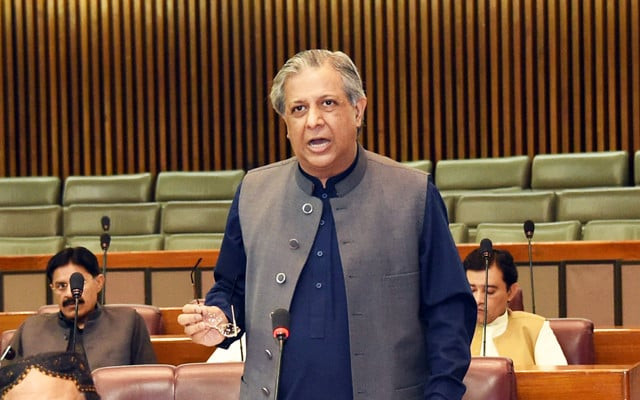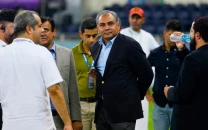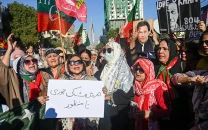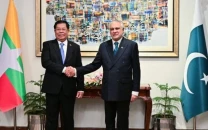Govt ministers regret ‘attempt to rewrite Constitution’
Law minister says apex court verdict to be respected by his party

The government on Friday scrambled to contain political fallout after a Supreme Court verdict stripped it of its muscular two-thirds majority in parliament, with federal ministers heaping scorn at majority decision.
Law Minister Azam Nazeer Tarar, while echoing the minority (dissenting) note, acknowledged the apex court’s authority to interpret the law. However, he added, the matter had gone beyond interpretation.
“It seems as if articles 51 and 106 [of the Constitution] have been rewritten. New things have been added to it which — as a student of the constitution — is difficult for me to digest,” Tarar said.
He said that the court’s decision would be respected by his party but as a lawyer and the law minister, the wording of the short order was blatantly against the “plain reading” of the Constitution.
Tarar said that there was no threat to the government after the decision of the apex court regarding reserved seats as it had a clear majority of 209 members in the House.
The minister said that the Sunni Ittehad Council (SIC) didn’t recognise non-Muslims as its members, adding that legal action would be decided in consultation with political parties.
He questioned that what about the condition of Article 51 of the Constitution. The independent members of the PTI had taken the stance that the reserved seats should be given to the SIC, he said, adding that apparently Article 51 and 106 were re-written, he said.
The minister said that they were closely examining the verdict. He said that there was a law about the reserved seats and it should have been allocated to the SIC.
He clarified that the Pakistan Tehreek-e-Insaaf (PTI) was not a party in this case and that independent members of the PTI did not approach any forum after winning.
Tarar said according to the SIC’s manifesto, they should not be allocated minority seats. He added that PTI never claimed that their party should get reserved seats.
Regarding the review appeal, Tarar said that a decision would be made after consulting of the federal cabinet and viewing the detailed judgment.
He said the ruling has raised ambiguities and confusion, and legal experts will continue to give their opinions on it.
The minister assured that the government would not confuse this constitutional issue with politics, adding that the ruling alliance had a clear majority of 209 members in the National Assembly. The PTI got a relief which it never prayed, he added.
Addressing a separate news conference, Advisor to the Prime Minister on Political Affairs and Inter-Provincial Coordination Rana Sanaullah said that the government would carefully review the details of the Supreme Court’s judgment on reserved seats before determining its next move.
He said that the government would consider filing a review petition on the Supreme Court’s decision on reserved seats after thoroughly examining the detailed judgment and consulting legal experts.
He said the decision to seek a review of the verdict lies with the cabinet.
Regarding PTI’s stance, he said, “PTI never claimed the reserved seats. If the Election Commission of Pakistan (ECP)misinterpreted the ruling, PTI could have interpreted it correctly. Even if PTI has made a mistake, the court must rectify it.”
He added, “The Supreme Court ruling did not favor the Sunni Ittehad Council (SIC), as their petition was not accepted by the court.”
He said that members who joined the Sunni Ittehad Council by giving an affidavit could be de-seated by the ECP if they join any other party.
Explaining the case, he said that some individuals participated in the general elections as independent candidates and, after winning, provided formal affidavits within three days, as per the constitution and law, to join the SIC.
He added that the SIC requested reserved seats, but the ECP maintained that since the Sunni Ittehad Council did not participate in the election as a party, these seats could not be allocated to them. The SIC then appealed to the Peshawar High Court, where this decision was upheld, and subsequently went to the Supreme Court.
“We hold the courts and judges in utmost esteem. They are the best at what they do. Judges have sworn to protect the constitution; rewriting it contravenes this oath,” he added.
He warned that allowing members who joined one party under an affidavit to switch parties could lead to new legal disputes.
Responding to a question, he said, that the Supreme Court’s ruling declaring PTI eligible for reserved seats was not a conspiracy against the Pakistan Muslim League-Nawaz-led (PML-N) coalition government.
He confidently noted that the PML-N-led government had sufficient numbers in the federal government and more than necessary in Punjab.
He reiterated that the primary agenda of the current government is to lead the country out of its economic crisis. The government is open to political dialogue, which PTI has previously refused. The Prime Minister has again extended an offer for dialogue during the budget session, he said.
To another question he said, the Pakistan Peoples Party (PPP) supports the government and actively participated in the federal budget process.
He said that Nawaz Sharif leads both the Punjab and federal governments, and the main agenda of the government is to resolve the economic crisis. He expressed hope that the upcoming budget would alleviate current difficulties.
Regarding election tribunal decisions, he said that the right to review exists, and if any member’s disqualification is upheld, new elections will be held in that constituency.


















COMMENTS
Comments are moderated and generally will be posted if they are on-topic and not abusive.
For more information, please see our Comments FAQ